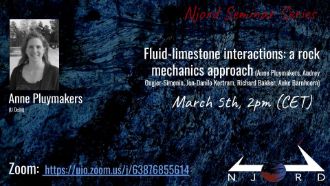Authors:
Anne Pluymakers, Audrey Ougier-Simonin, Jon-Danilo Kortram, Richard Bakker, Auke Barnhoorn
Abstract:
Knowledge on the mechanical behaviour of carbonate rocks, such as limestones, is paramount for various geo-energy applications (hydrocarbon production, geothermal energy production, and subsurface energy storage) as they are common reservoir rocks, and also fundamental to explain the core mechanisms of some natural hazards in such rocks (earthquakes, sinkholes). In the Netherlands, there is currently renewed interest in limestone properties, since the Dinantian limestones are one of the key targets for future deep geothermal energy extraction. Understanding rock strength is critical to determine safe operating limits for subsurface energy extraction. However, the solubility of limestone makes it particularly sensitive to fluid-rock interaction, which has the potential to significantly alter its strength.
We performed triaxial tests on Comiso limestone and Treuchtlinger Marmor at room temperature and a range of confining pressures. We used Comiso limestone as an analogue material for a hydrocarbon reservoir, and Treuchtlinger Marmor as an analogue for the Dinantian geothermal reservoirs. The Comiso was exposed to two different, naturally occurring fluids (MgSO4 and Na2SO4). The Treuchtlinger Marmor was exposed to two fluid types used in the geothermal industry (inhibitor 1 and 2). The results are compared to a set of control experiments where the limestones were in contact with a neutral solution (DI water or CaCO3-saturated). In this talk, I will show how both naturally occurring fluids and industrial fluids can significantly alter limestone's strength. These new results stress out how the chemo-mechanical impact of pore fluid in a reservoir rock can drive a different mechanical response within days - whereas slow geological processes usually take on the order of centuries and millennia.
You will find the complete schedule for Njord Seminar Series spring '21 here.
To get news, invitations to seminars and more from Njord, please go here to subscribe to our newsletter.
